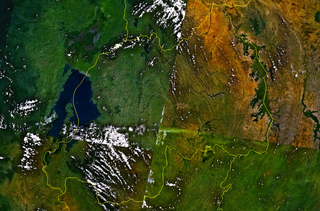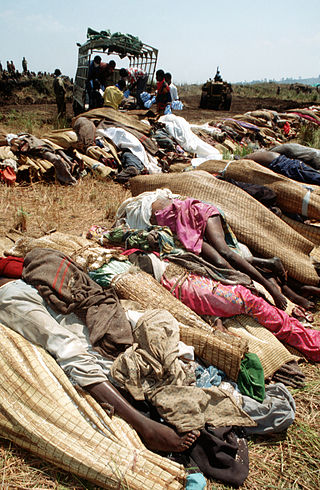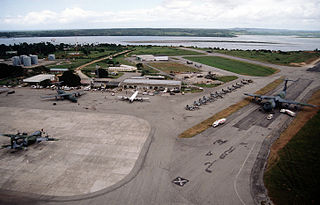
The United Nations Assistance Mission for Rwanda (UNAMIR) was established by United Nations Security Council Resolution 872 on 5 October 1993. It was intended to assist in the implementation of the Arusha Accords, signed on 4 August 1993, which was meant to end the Rwandan Civil War. The mission lasted from October 1993 to March 1996. Its activities were meant to aid the peace process between the Hutu-dominated Rwandese government and the Tutsi-dominated rebel Rwandan Patriotic Front (RPF). The UNAMIR has received much attention for its role in failing, due to the limitations of its rules of engagement, to prevent the Rwandan genocide and outbreak of fighting. Its mandate extended past the RPF overthrow of the government and into the Great Lakes refugee crisis. The mission is thus regarded as a major failure.

United Nations Security Council resolution 872, adopted unanimously on 5 October 1993, after reaffirming resolutions 812 (1993) and 846 (1993) on the situation in Rwanda and Resolution 868 (1993) on the security of United Nations operations, the council stressed the need for an international force in the country and therefore established the United Nations Assistance Mission for Rwanda (UNAMIR).

United Nations Security Council resolution 893, adopted unanimously on 6 January 1994, after reaffirming resolutions 812 (1993), 846 (1993), 872 (1993) and 891 (1993) on Rwanda, the Council noted that the situation in Rwanda could have implications for neighbouring Burundi and authorised the deployment of a second military battalion of the United Nations Assistance Mission for Rwanda (UNAMIR) to the demilitarised zone.

United Nations Security Council resolution 909, adopted unanimously on 5 April 1994, after reaffirming resolutions 812 (1993), 846 (1993), 872 (1993), 891 (1993) and 893 (1994) on Rwanda, the Council expressed concern at deteriorating security and humanitarian situation in the country, particularly in Kigali, and extended the mandate of the United Nations Assistance Mission for Rwanda (UNAMIR) until 29 July 1994.

United Nations Security Council resolution 912, adopted unanimously on 21 April 1994, after reaffirming all resolutions on the situation in Rwanda, particularly resolutions 872 (1993) and 909 (1994), the council expressed its alarm and condemnation of the large-scale violence in the country which resulted in the death of thousands of innocent civilians, and proposed a revised mandate of the United Nations Assistance Mission for Rwanda (UNAMIR).

United Nations Security Council resolution 918 was adopted without a vote on 17 May 1994. After reaffirming all resolutions on the situation in Rwanda, particularly resolutions 872 (1993), 909 (1994) and 912 (1994), the Council expressed its alarm and condemnation at the continuing large-scale violence, and went on to impose an arms embargo on the country and authorise an expansion of the United Nations Assistance Mission for Rwanda (UNAMIR).

United Nations Security Council resolution 925, adopted unanimously on 8 June 1994, after reaffirming all resolutions on the situation in Rwanda, particularly resolutions 912 (1994) and 918 (1994), and Resolution 868 (1993) on the safety of United Nations peacekeepers, the council deployed additional battalions and extended the mandate of the United Nations Assistance Mission for Rwanda (UNAMIR) until 9 December 1994.
United Nations Security Council resolution 928, adopted unanimously on 20 June 1994, after reaffirming resolutions 812 (1993), 846 (1993) and 891 (1993) on the situation in Rwanda, the Council stressed the need to continue to implement the arms embargo on the country imposed in Resolution 918 (1994) and extended the mandate of the United Nations Observer Mission Uganda–Rwanda (UNOMUR) for a final period of three months until 21 September 1994.

United Nations Security Council resolution 929, adopted on 22 June 1994, after recalling all resolutions on Rwanda, including 912 (1994), 918 (1994) and 925 (1994), the council authorised, under Chapter VII of the United Nations Charter, the temporary establishment of a multinational operation in the country to assist in humanitarian efforts and protect refugees and displaced people, until the full deployment of the expanded United Nations Assistance Mission for Rwanda (UNAMIR).

United Nations Security Council resolution 935, adopted unanimously on 1 July 1994, after recalling all resolutions on Rwanda, particularly 918 (1994) and 925 (1994), the Council requested the Secretary-General Boutros Boutros-Ghali to establish a Commission of Experts to investigate violations of international humanitarian law during the Rwandan genocide.
United Nations Security Council resolution 946, adopted on 30 September 1994, after reaffirming Resolution 733 (1992) and all of its subsequent resolutions on the situation in Somalia, the council extended the mandate of the United Nations Operation in Somalia II for a period of one month until 31 October 1994.

United Nations Security Council resolution 965, adopted unanimously on 30 November 1994, after reaffirming all resolutions on the situation in Rwanda, particularly resolutions 872 (1993), 912 (1994), 918 (1994), 925 (1994) and 955 (1994), the Council extended the mandate of the United Nations Assistance Mission for Rwanda (UNAMIR) until 9 June 1995 and expanded its operations.

United Nations Security Council resolution 978, adopted unanimously on 27 February 1995, after recalling all previous resolutions on Rwanda, including 935 (1994) and 955 (1994), the Council instructed Member States on the arrest and detention of persons responsible for acts during the Rwandan genocide, within the jurisdiction of the International Criminal Tribunal for Rwanda (ICTR).

United Nations Security Council resolution 997, adopted unanimously on 9 June 1995, after reaffirming all resolutions on the situation in Rwanda, particularly resolutions 872 (1993), 912 (1994), 918 (1994), 925 (1994), 955 (1994) and 965 (1994), the Council extended the mandate of the United Nations Assistance Mission for Rwanda (UNAMIR) until 8 December 1995 and adjusted its operations from peacekeeping to confidence-building.

United Nations Security Council resolution 1011, adopted unanimously on 16 August 1995, after recalling resolutions 918 (1994), 997 (1995) and 1005 (1995) on the situation in Rwanda, the Council suspended the arms embargo against the Government of Rwanda.

United Nations Security Council resolution 1029, adopted unanimously on 12 December 1995, after recalling previous resolutions on Rwanda, including Resolution 872 (1993), Resolution 912 (1994), Resolution 918 (1994), Resolution 925 (1994), Resolution 955 (1994), Resolution 965 (1994), Resolution 978 (1995) and Resolution 997 (1995), the Council extended the mandate of the United Nations Assistance Mission for Rwanda (UNAMIR) for a final time, ending 8 March 1996, and adjusted its mandate.

United Nations Security Council resolution 1049, adopted unanimously on 5 March 1996, after reaffirming Resolution 1040 (1996) concerning Burundi, the Council called for an end to violence in the country and discussed preparations for a conference on security in the African Great Lakes region.

United Nations Security Council resolution 1053, adopted unanimously on 23 April 1996, after recalling all previous resolutions on Rwanda, particularly resolutions 918 (1994), 997 (1995), 1011 (1995) and 1013 (1995), the Council reviewed the findings of the Commission of Inquiry concerning violations of the arms embargo against former Rwandan government forces.

United Nations Security Council resolution 1078, adopted unanimously on 9 November 1996, after expressing concern at the situation in the African Great Lakes region, the Council discussed proposals for a regional conference on security and a multinational humanitarian force in eastern Zaire.

United Nations Security Council resolution 1080, adopted unanimously on 15 November 1996, after reaffirming Resolution 1078 (1996) on the situation in the African Great Lakes region, the council, acting under Chapter VII of the United Nations Charter, established a multinational humanitarian force in eastern Zaire.
















